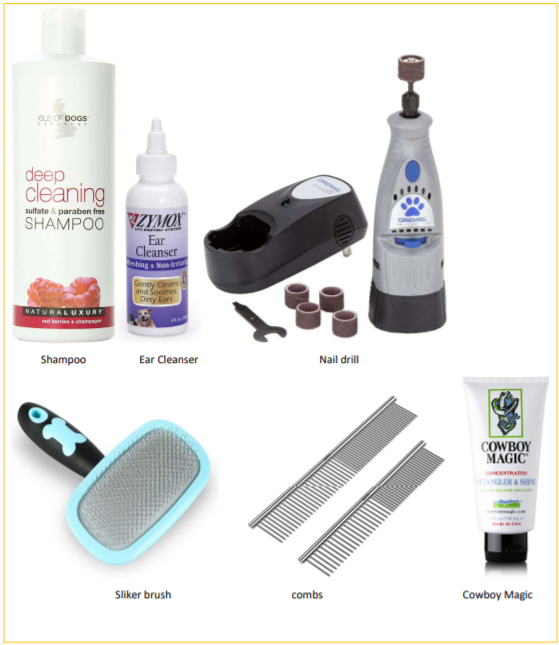Establishing a feeding schedule is an important part of your puppy’s training and it can give you a better understanding of when your puppy will need to go potty, making house-training easy and helping you keep his digestive system regular. You should watch your puppy to see the amount of food he eats to determine the serving size. Your puppy’s bag of food should have feeding instructions on the label. We will provide a food sample of the food that your puppy has been with since weaned. We feed Purina Pro Plan Lamb and Rice Puppy Formula. You can purchase Purina Pro plan dog food online on Amazon.com, chewy.com, or at local pet stores like PetSmart or Tractor Supply. We recommend Purina Pro Plan, but for any giving reason you decide to change food try not to do it drastically and avoid chicken; doodles have sensitive stomachs towards Chicken. Introduce the new food slowly mixing it in with the previous food for about a week until change is complete. You may notice the Puppy’s poop getting softer, it could be the change in the food or water, as we are in well water, and changing to city water can affect the consistency of their poop.

Stainless steel bowl
Water is essential for the health and nutrition of all puppies. Therefore, fresh water must be available to your puppy at all times. Your puppy constantly loses fluids naturally that's why it's so important for your puppy to drink enough water so that he replaces what he loses. The water bowl should be emptied daily and washed constantly as bacteria can quickly build up, from things that blow or drift into the bowl or of food dropped into it. Stainless steel bowls are the easiest types of bowls to maintain clean, also the safest bowl for your dog to eat and drink from. The material will not leach potentially dangerous chemicals into your dog's food and water, like some plastics, aluminum, and is less likely to accumulate bacteria.

A grooming routine with your dog helps you maintain his best health and lets you visually detect signs of potential issues that may require your veterinarian’s attention. It can also be a great way to start a bond with your dog. Your Puppy will not need any professional grooming until 6-8 months of age, until the adult doodle coat comes in. We recommend to take the puppy, fully vaccinated, to a groomer before that age to get used to being groomed (puppy cut). You can also help your puppy get comfortable being groomed by doing weekly puppy (sanitary) clean up like bathing, brushing trimming nails and cleaning ears.
Dogs do not need Frequent baths. excessive bathing can dry out your dog’s coat and skin. Any dog shampoo works great on their coats. They do need constant brushing due to longer coats. A sliker brush or metal comb works great for (brushing their coat)
List of things you may need.
Keeping your puppy in a crate when you can’t supervise them is like putting a baby in a pack n play or a crib. This is the best place to keep them so they don’t get into something they shouldn’t. The crate is never used as a punishment because you do not want your dog to get the wrong idea of a crate by associating it with a bad experience. Although it can also become one of your pup’s favorite places to go if they are properly trained. You can take the crate and put a dog bed in the bottom to make the crate nice and cozy. It is important to note that if a dog is not trained to be comfortable in a crate to begin with, it can be difficult to use a crate for house-training or when having to travel/evacuate. Crating comfortably is a skill every dog should have.
Treats are a great way to begin showing positive reinforcement towards your puppy during training. For treats we are currently using regular peanut butter and animal crackers that you would buy at any local grocery store. Your puppy has been introduced to both treats at Texas Doodles and love them! When giving your puppy a treat, make sure to break the crackers into 2 or 3 pieces to avoid possible choking. Do not give more than what they will eat in a serving per day. You can slowly start introducing new treats, one at a time to avoid upset stomach. Chew toys such as flavored nylon bones are good for them to chew on, especially during their teething phase (5-6 months of age). If you or anybody you know hunts, deer antlers are also good to let your puppy chew on. Please DO NOT give your puppy rawhide. Rawhide is NOT good for your baby for a list of reasons associated with contamination, digestive distress (like not properly dissolving and causing intestinal blockage) and choking hazard. Another major choking hazard is to give your puppy cotton stuffed toys to play with, so please keep an eye out for the puppy tearing the toy apart and swallowing it. If your puppy does begin to do this immediately remove toy from them. If your dog can fit a toy in his mouth the toys too small and could be unsafe. Avoid sponge toys or items with squeakers, whistles, or other attached parts that your dog could swallow. Keep your dog away from children's toys made of soft rubber, fur rubber, wool, sponge or polyethylene.
